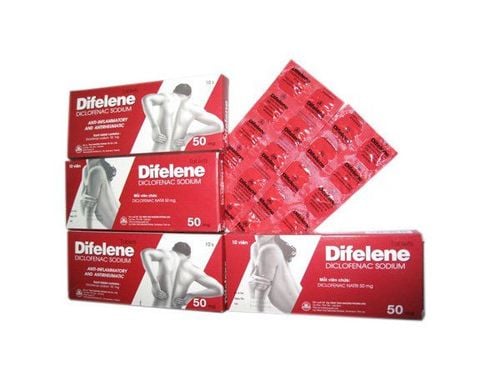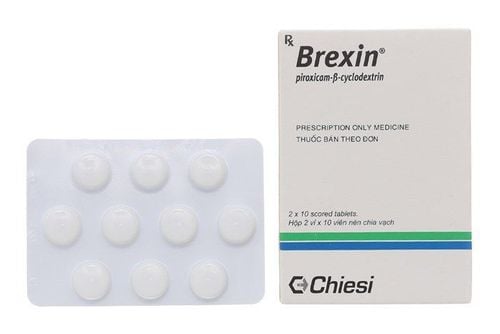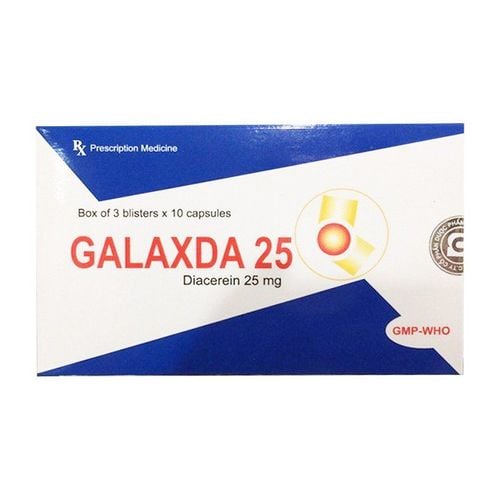This is an automatically translated article.
Difelene has the active ingredient of sodium diclofenac 50g with excipients, is made in the form of enteric-coated film-coated tablets. The drug is mainly used to treat inflammatory conditions, osteoarthritis, rheumatism,...1. What is the effect of Difelene?
What disease does Difelene treat? This medication is used to treat inflammatory and degenerative forms of the joints, rheumatism, chronic osteoarthritis, and ankylosing spondylitis. In addition, the drug also works to reduce pain caused by inflammation (not the cause of rheumatism).
Some other effects of Difelene are not listed on the drug label. The doctor may prescribe the patient to take medication to treat some other medical conditions.
2. Contraindications to the use of Difelene
Some subjects should not use Difelene medicine, including:
People who are sensitive to diclofenac sodium, any ingredient of Difelene, aspirin or other non-steroidal anti-inflammatory drugs; Patients with advanced gastric ulcer; People with asthma, bronchospasm, cardiovascular disease, severe liver or kidney failure; People who are taking coumarin anticoagulants; People who are using contact lenses; Children under 12 years old; People with hypovolemia due to diuretics or renal failure, glomerular filtration rate less than 30ml/min; People with colloid disease, at risk of aseptic meningitis; People with congestive heart failure (grade II - IV), peripheral artery disease, ischemic heart disease, cerebrovascular disease.

Thuốc Difelene cần được sử dụng đúng đối tượng đúng chỉ định
3. How to use and dose of Difelene
How to use: You take the drug orally with filtered water / boiled water to cool immediately after eating. To reduce the risk of adverse events, you should use Difelene at the lowest effective daily dose and for the shortest possible time (as prescribed by your doctor).
The drug is only for use by people 12 years of age and older. Dosage as follows:
Osteoarthritis: Take 1 tablet/time, use 3 times/day. If long-term treatment, take 1 tablet/time, use 2 times/day; Ankylosing spondylitis: Take 1 tablet/time, use 2-3 times/day; Rheumatoid arthritis (rheumatism): Take 2-4 tablets/day, divided into several times. Do not use more than 4 tablets (200mg)/day. If long-term treatment, use 2 tablets / day, divided into 2 times / day; Pain relief: Take 1 capsule/time, use 3 times/day; Pain relief for cancer patients: Take 2 tablets/time, use 2 times/day. *Note: Dosage information is not a substitute for medical advice. Patients should consult their doctor before taking the drug.
In case of drug overdose, the patient should immediately call the emergency center or go to the nearest medical facility. The doctor will induce vomiting or gastric lavage for the patient and combine treatment for symptoms of overdose. Then, the doctor can give the patient activated charcoal to reduce the absorption of the drug in the gastrointestinal tract and the liver-gut cycle.
If a dose is missed, the patient should take it as soon as possible. If it is almost time for the next dose to be missed, skip the missed dose, take the next dose at the prescribed time, do not double the dose.
4. Side effects when taking Difelene thuốc
Patients may experience some side effects when using Difelene such as:
Common: Restlessness, headache, nausea, epigastric pain, vomiting, diarrhea, loss of appetite, bloating, difficulty diarrhea, tinnitus,...; Uncommon: Edema, allergy, bronchospasm in asthmatic patients, anaphylaxis, rhinitis, urticaria; abdominal pain, gastrointestinal bleeding, progressive ulceration; insomnia, excitability, mild hearing disturbance, loss of balance, dizziness, dizziness, depression, itching, blurred vision,...; Rare: Edema, rash, alopecia, aseptic meningitis, thrombocytopenia and leukopenia, anemia, agranulocytosis, eosinophilia; cystitis, hematuria, acute renal failure, nephrotic syndrome, interstitial nephritis; gallbladder contractility disorder, hepatitis, jaundice. In addition, several clinical and epidemiological trials have shown that the use of the drug is associated with an increased risk of cardiovascular thrombotic events (myocardial infarction or stroke), especially when used. long-term and high-dose drugs.

Thuốc Difelene có thể gây nhức đầu cho người sử dụng
5. Note when using Difelene in special cases
For people in special cases (pregnant, breastfeeding,...) need to pay attention when taking Difelene:
Pregnant women: Do not use the drug during pregnancy, especially is in the last 3 months because the drug has the risk of inhibiting uterine contractions, increasing the irreversible circulatory pressure, possibly causing renal failure in the fetus; People planning to become pregnant: Do not use Difelene because it inhibits implantation; Lactation: The drug should only be used when breastfeeding is stopped. In other cases, weigh the risks/benefits and consult your doctor.
6. Drug interactions
Difelene may change the effects of other medicines or increase the effects of side effects. Therefore, to avoid drug interactions, patients should give their doctor a list of all the drugs they are taking. In addition, to ensure safety when using the drug, patients should not arbitrarily take the drug, stop or change the dose without the permission of the doctor.Do not use Difelene in combination with the following drugs:
Oral anticoagulants and heparin: May cause heavy bleeding; Quinolone antibiotics: May cause increased central nervous system side effects, leading to convulsions; Aspirin or Glucocorticoid: These drugs reduce plasma concentrations of diclofenac and increase the risk of gastrointestinal bleeding; Lithium: Diclofenac may increase serum lithium concentrations to toxic levels. If it is necessary to use a combination of 2 drugs, it is necessary to carefully monitor the patient to promptly detect signs of toxicity, adjust the dose of lithium in time,...; Diflunisal: If used concurrently with diclofenac, it will increase the concentration of diclofenac in the blood plasma, reduce the clearance of diclofenac, may cause severe bleeding in the gastrointestinal tract; Digoxin : Difelene may increase serum digoxin concentrations, prolonging the half-life of digoxin. Therefore, the doctor needs to measure the concentration of digoxin in the blood, reduce the dose of digoxin if 2 drugs are used together; Ticlopidine: Concomitant use with diclofenac increases the risk of bleeding; Methotrexate: Diclofenac increases the toxicity of methotrexate in plasma, increasing the possibility of toxicity; Intrauterine IUDs: There is evidence that diclofenac is ineffective in preventing pregnancy. Difelene can be used together with the following drugs, but patients should be closely monitored: Diuretics, antihypertensives, Cyclosporin, Probenecid, Cimetidine,...
Difelene should be stored at a temperature not exceeding 30°C, keep out of reach of children and pets. When taking drugs, patients should strictly follow the doctor's instructions to ensure treatment effectiveness and avoid unpredictable side effects.
Follow Vinmec International General Hospital website to get more health, nutrition and beauty information to protect the health of yourself and your loved ones in your family.
Please dial HOTLINE for more information or register for an appointment HERE. Download MyVinmec app to make appointments faster and to manage your bookings easily.













